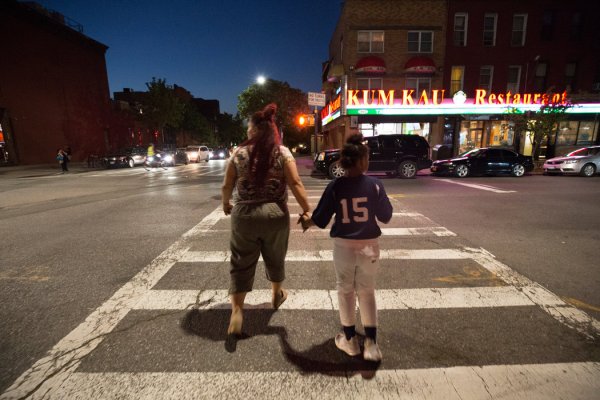Patricia Llanes is a Brooklyn virtuoso, a historian of sorts. She and her family have lived in the same apartment in Bedford-Stuyvesant for 42 years. She knows the radio stations that will play Jay Z’s “Reasonable Doubt” on Tuesday evenings, the quickest route to the neighborhood community garden and the history of gas stations and bodegas that have been destroyed, only to be reborn into cafes and co-ops.
In this neighborhood Ms. Llanes knows so well, she is known as the commissioner of the Bed Stuy Sluggers, a small, close-knit predominantly black and Latino Little League, formerly known as the Inner City Sports Little League.
“I try not to think of myself as the head honcho,” she said. “I just got involved because my son got caught up in a gang when they told him that he couldn’t play in the league anymore.”

At face value, the Bed Stuy Sluggers is just a baseball league. But the collective of teams also serves as a safe space for the black and Latino youth in the community.
“We’re trying to allow kids a space to have fun, let go of the cellphones and let the kids back into the community, because the community was dying,” Ms. Llanes said. “It’s been a struggle to get the kids back into baseball and keeping parents engaged.”
In addition to Ms. Llanes, Keri Weaver serves in the league’s administration, and Yaseen Allah is a head coach. He’s known as “Supreme.” They play similarly critical roles in working to maintain this bit of community.

“Bed-Stuy is special, it has always been special,” Ms. Llanes said. “I am Puerto Rican, born and raised in Brooklyn, mom was born in Puerto Rico, Dad was born here. Growing up Latina, that’s where the baseball is drilled into me. Even though I’m a girl, I grew up in a household where my dad played right behind my house.”

Mr. Allah, who also grew in Bedford-Stuyvesant, usually works with one team of children through years of baseball development.
“I have knowledge of the game and want to teach it to our young brothers and sisters because of it’s not the same as it used to be,” he said. “I’ve had this team in particular, the Yankees, for the past four or five years. I consider them nearly my kids.”

Ms. Llanes joined the Little League community in 2001 while looking to enroll her son. Almost 20 years later, she now has a daughter who also plays for the Bed Stuy Sluggers.
However, Ms. Llanes said that since the Inner City league ended after rumors of misallocated funds by past leaders, it’s been hard to find enough players for the league to survive on its own. As a result, Bed-Stuy teams go up against teams in other leagues around the city.

“I knew when I assumed the role it was going to be rough,” Ms. Llanes said. “It still is rough, and the league is not what it used to be. I’m used to seeing multiple parks and games happening at same time. We have, however, gone from two teams to six since restarting the program.”
But Ms. Llanes, who works full time as the division director for an at-risk women’s center, said that despite the troubles, there’s a larger plan.
In the grand scheme, our ultimate goal is to try to get our African-American and Latino youth back engaged in baseball, she said. “I think one of our biggest troubles is that they feel they can’t afford the registration. Some parents are too proud to ask for assistance. We don’t have a problem sponsoring and ensuring that they play.”
Coaches and league administrators provide funding out of their own pockets, paying for uniforms and sponsoring players who can’t afford the registration fee.
“If we don’t have the money, we don’t care,” Ms. Llanes said. “We give him a uniform, because, if anything, I know those two days are the ones he will play the hardest. It’s about showing them community — because we are losing our community.”


